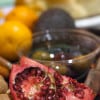Here are the Top 10 quick and useful suggestions from Hazon, to make your Purim more healthy and sustainable. To find out more information and suggestions from Hazon for Purim, visit the Hazon Purim Resource Page. 1 – Purim Recipes 2 – Edible Groggers Serve crispy, crunchy, NOISY foods this Purim (try things like: fresh veggies and yogurt-dill dip, blue corn chips and salsa or home made pita chips with your favorite store-bought or home made hummus). As guests snack away, their crunches will let Haman know what a wicked, wicked man he really was. 3 – Can the Canned Fruit! You may want to buy fruit for your hamentashen filling, but try your best to avoid fruit from a can! Buy your fruit for your hamentashen in glass jars, or use fresh fruit. Cans (and most plastics) are lined with a chemical called Bisphenol-A (BPA) which is an endocrine disruptor, and a chemical that all should try their best to avoid. Learn more about Bisphenol-A from Grassroots Environmental Education. 4 – Sustainable Drinks Don’t forget to drink sustainably this Purim. Pick an organic wine from our kosher, organic wine list. For some celebratory Whiskey for Purim, check out the Koval Distillery in Chicago for organic spirits. Or mix your […]








